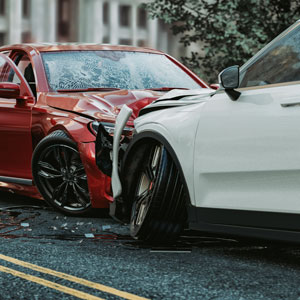 Breaking Down Personal Injury
Breaking Down Personal InjuryPersonal injury in the context of a vehicle accident refers to harm or damage to a person resulting from the incident. It’s important to distinguish personal injury claims from property damage claims. If your car is damaged in an accident, you have a property damage claim. However, if you are physically injured or suffer other losses due to the accident, you may have a personal injury claim.
Simply being involved in an accident does not automatically entitle you to compensation, however. All four of the following elements must be present to have and pursue a personal injury claim:
The first element is that the other party owes you a duty of care. This means they had an obligation to act in a manner that would avoid causing harm to others. For example, all drivers have a duty to follow traffic laws and drive safely.
The second element is a breach of that duty. This occurs when the other party fails to meet their obligation. In the context of a vehicle accident, this could mean anything from running a red light to driving under the influence.
The third element is causation, which links the breach of duty directly to your injuries. You must show that the other party’s breach of duty caused the harm you suffered. For instance, if the other driver ran a red light and hit your car, causing your injuries, there is a direct link between their breach and your harm.
The fourth element is damages, which refers to the losses you incurred as a result of the accident. This can include medical expenses, lost wages, pain and suffering, and other related costs.
In short, you must be able to prove that another party’s negligence caused your injuries and that you suffered actual damages as a result.
In the chaotic aftermath of a vehicle accident, knowing the right steps to take can make a significant difference in ensuring your safety and protecting your legal rights. Remember, while these steps provide a general guideline, there is no one-size-fits-all checklist of what to do after an accident. Each accident situation is unique. Ultimately, your health and well-being should always come first. Do not forget this.
Your health is the top priority. If you’re incapacitated or experiencing severe pain, seek immediate medical attention. If you’re unconscious or severely injured, let the paramedics take over. Don’t attempt to move or treat yourself if you’re seriously hurt.
Even if you feel fine, it’s important to get checked out. Adrenaline can mask injury symptoms immediately following an accident. Visit an urgent care center or your primary care physician as soon as possible, especially if you feel sore or have any other concerns the next day. Your physical well-being aside, the sooner you document injuries or complaints, the easier it is to correlate it to the accident later in your case. This is critical to building a strong case.

Prominent personal injury Attorney Monty Yolles at The Yolles Legal Group in Maryland has a wealth of experience helping clients navigate complex vehicle accident cases. With a deep understanding of Maryland’s unique contributory negligence laws and a track record of successfully advocating for clients who have suffered physical and emotional harm, Monty is well-equipped to guide you through the legal process. His commitment to ensuring fair compensation and justice for those impacted by accidents reflects his dedication to the field.
For legal support tailored to your needs, contact The Yolles Legal Group to schedule a consultation today.
If you are physically able, collect as much information as you can at the scene. This includes:
Take pictures of the accident scene, vehicle positions, damage, and any visible injuries.
Get the other driver’s name, contact information, insurance details, and vehicle registration. Also, note the make, model, and license plate number of their vehicle.
If there are any witnesses, get their names and contact information. Their statements will be crucial later.
If possible, walk around the scene to document everything thoroughly. This includes road conditions, traffic signs, and any other relevant environmental factors that might have contributed to the accident.
If you’re in Maryland, you need to understand that it is a contributory negligence state. This means if you are even 1% at fault for the accident, you may be completely barred from recovering any damages. This is in contrast to the majority of states, which operate under a comparative negligence system where fault is distributed among all parties involved, and you can still recover damages even if you are partially at fault. Here are some key things to consider as your personal injury case takes shape:
Determine if the other party owed you a duty of care and if they breached that duty. For instance, in a car accident, drivers have a duty to follow traffic laws and drive safely. If the other driver didn’t, and this caused the accident, you likely have solid grounds to stand on with regard to contributory negligence.
It will be worthwhile to reflect on your actions to see if you might have contributed to the accident in any way. Even a minor contribution to the cause of the accident will prevent you from recovering damages.
Document any physical injuries sustained in the accident. Seek medical attention to get a thorough assessment and documentation of your injuries. Consider any damage to your vehicle or other personal property. Take into account any emotional distress or financial burdens, such as medical bills and lost wages.
The surest way to determine if you have a personal injury case is to consult with a personal injury attorney. They can provide a professional assessment of your situation, taking into account the specifics of your case and Maryland’s contributory negligence law. Contact one as soon as you can. Early consultation can help preserve evidence, gather witness statements, and ensure that you meet all necessary legal deadlines.
Most personal injury attorneys work on a contingency fee basis, meaning they only get paid if you win your case. This arrangement shifts the financial risk to the attorney, making it more accessible for you to seek legal advice without worrying about upfront costs. If your case does not result in a recovery, you typically owe nothing in attorney fees. This makes it beneficial to at least consult with an attorney to understand your options.
Many law firms offer free initial consultations. During this process, an intake specialist or the attorney will gather details about your case to assess its viability. What’s more, consulting with an attorney does not obligate you to pursue a case. It’s a chance to get some clarity and understand your legal standing. There’s really no reason not to at least have a consultation with an attorney, given all of these realities.
For more information on Understanding Personal Injury in Vehicle Accidents, an initial consultation is your next best step. Get the information and legal answers you are seeking by calling (301) 670-0443 today.

Prominent personal injury Attorney Monty Yolles at The Yolles Legal Group in Maryland has a wealth of experience helping clients navigate complex vehicle accident cases. With a deep understanding of Maryland’s unique contributory negligence laws and a track record of successfully advocating for clients who have suffered physical and emotional harm, Monty is well-equipped to guide you through the legal process. His commitment to ensuring fair compensation and justice for those impacted by accidents reflects his dedication to the field.
For legal support tailored to your needs, contact The Yolles Legal Group to schedule a consultation today.